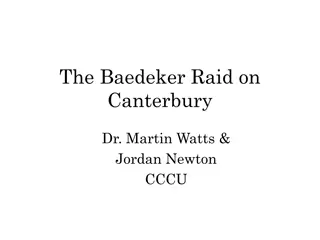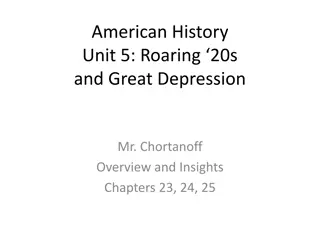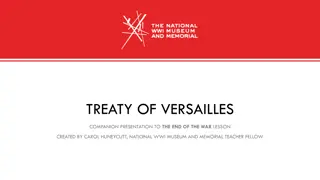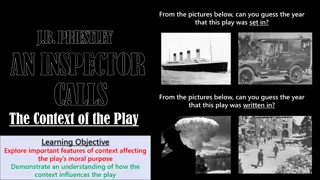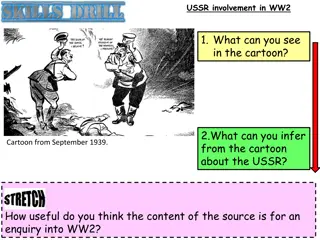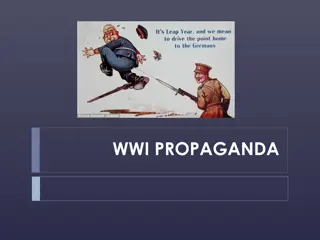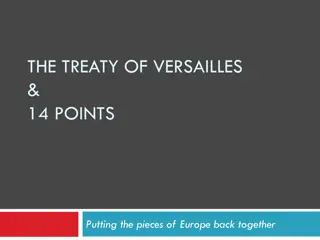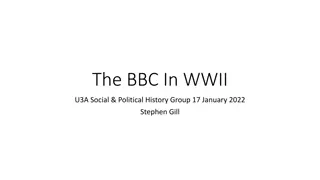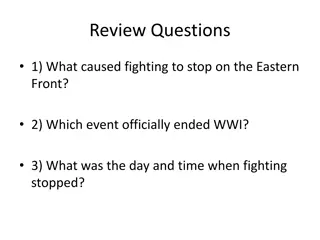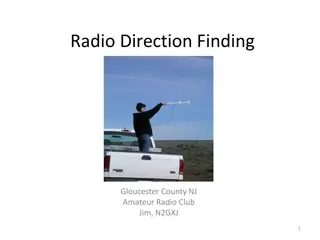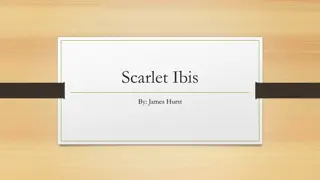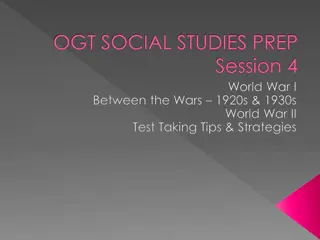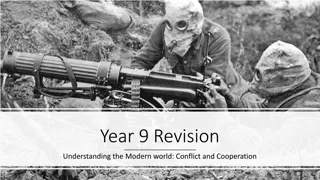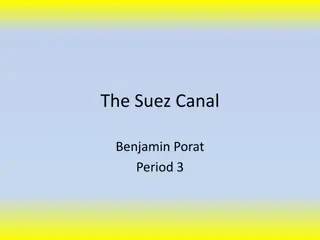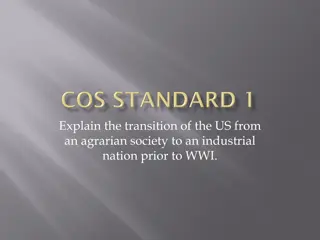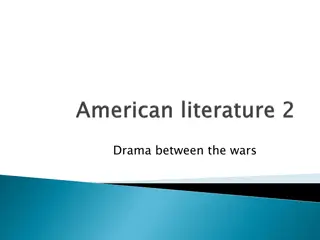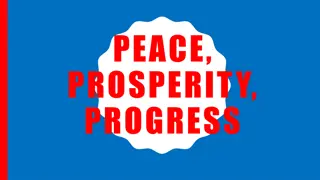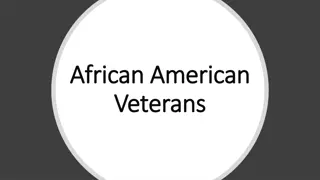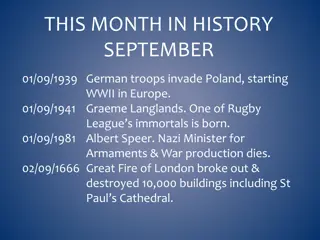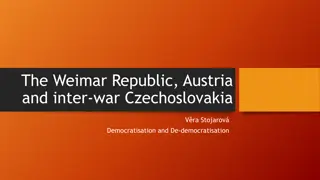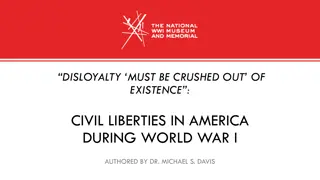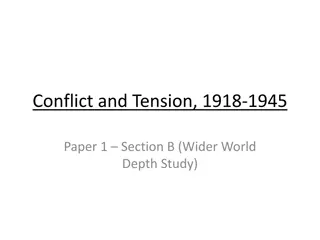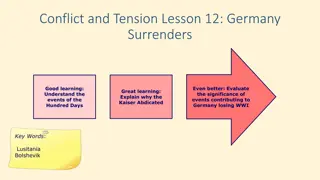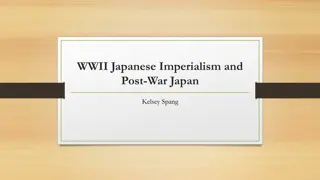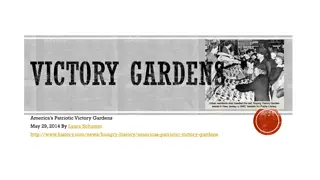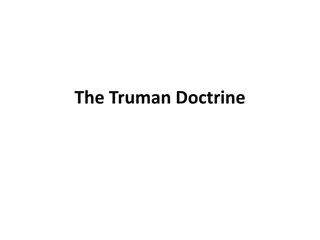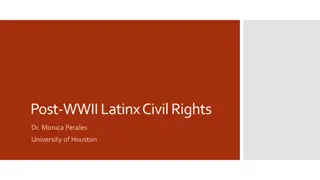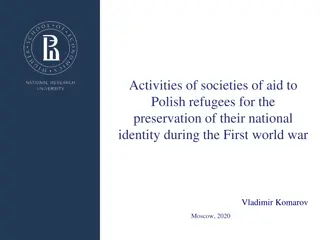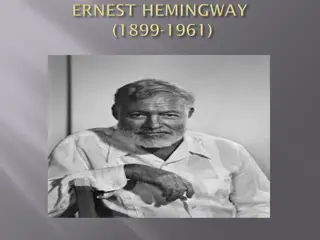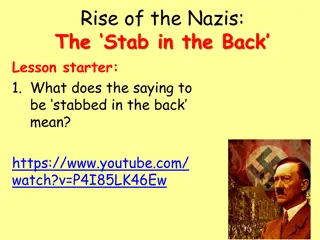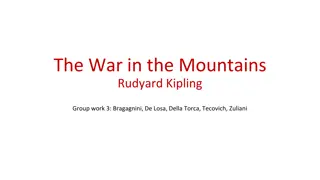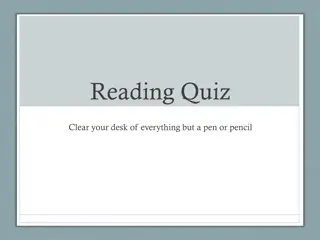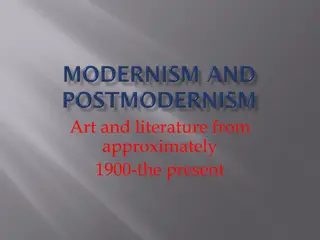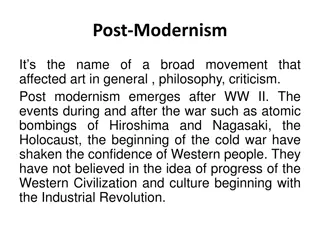The Impact of WWII Bombing Raids on Canterbury and Surrounding Cities
Explore the historical events of WWII bombing raids on Canterbury, Coventry, London, and other cities, focusing on the destruction caused, civilian reactions, strategic objectives, and preparatory measures taken. Witness the escalation of heavy raids, the targeting of cultural landmarks, and the shi
0 views • 25 slides
American History Unit 5: Roaring 20s and Great Depression Overview
The Roaring 1920s brought economic prosperity, cultural changes, and political developments. The Great Depression followed, leading to desperation and significant reforms. Explore the impact of key events and personalities such as President Hoover and FDR, the Age of Jazz and Popular Culture, and th
0 views • 12 slides
Treaty of Versailles Companion Presentation: Understanding the End of WWI
Explore the Treaty of Versailles and its significance through a companion presentation covering the Paris Peace Conference, major players like the Big 3, negotiation roles, and key terms. Learn about the attitudes of France, Great Britain, and the United States towards Germany post-WWI, the terms of
1 views • 14 slides
Contextual Evolution in J.B. Priestley's Play: An Inspector Calls
J.B. Priestley's play "An Inspector Calls" was set in 1912 but written in 1945, reflecting the significant changes in society between these years. Explore the context and events that influenced Priestley's work, showcasing his socialist views and the impact of historical events like WWI and WWII on
0 views • 12 slides
The USSR and Nazi Germany: The Pact of 1939
In the lead-up to WWII, the USSR signed a non-aggression pact with Nazi Germany, shocking the world. This pact included secret clauses dividing Poland and avoiding conflict for ten years. The USSR's alliance with Germany was a strategic move by Stalin due to fear of invasion and perceived weakness o
0 views • 13 slides
Understanding Wartime Propaganda in WWI
Wartime propaganda during WWI was employed for various purposes such as recruiting soldiers, financing the war effort, and unifying the country. It used tools like demonization, emotional appeals, patriotic appeals, and half-truths to sway public opinion and support the war. An in-depth analysis of
0 views • 7 slides
The Impact of Treaty of Versailles and 14 Points on Europe Post-WWI
In the aftermath of World War I, the Treaty of Versailles and President Woodrow Wilson's 14 Points played pivotal roles in shaping Europe. The treaty aimed to restore peace by addressing the damages caused by the war, with key players like Wilson, George Clemenceau, David Lloyd George, and Vittorio
3 views • 19 slides
The BBC in WWII: A Historical Overview
The BBC played a significant role during WWII, adapting to wartime conditions and providing essential news and entertainment to the public. From its pre-war development to its transformation during the outbreak of war, the BBC served as a vital communication tool and source of information for the Br
4 views • 31 slides
Woodrow Wilson's 14 Points and the End of WWI
Woodrow Wilson's 14 Points were a series of peace proposals aimed at ending World War I and establishing lasting peace. These points included measures such as ending secret treaties, ensuring freedom of the seas, and promoting self-determination. Wilson's efforts were recognized with the Nobel Peace
3 views • 10 slides
Fascinating World of Radio Direction Finding (RDF) Through History
Explore the intriguing world of Radio Direction Finding (RDF), an essential technique for determining the direction of radio signals. From its origins with Heinrich Hertz in 1888 to its pivotal role in military operations during WWI and WWII, RDF technology has evolved over the years while still rel
9 views • 23 slides
Analysis of "The Scarlet Ibis" by James Hurst
In "The Scarlet Ibis" by James Hurst, the narrator reflects on his relationship with his physically disabled brother, Doodle. Set in the American South during WWI, the story explores themes of brotherhood, fear, and the consequences of pride and cruelty. Through the protagonist's actions and the tra
0 views • 18 slides
Understanding the Impact of World War I on Global History
Delve into the multiple causes and effects of World War I, such as militarism, imperialism, nationalism, and alliances. Explore how the global scope of WWI shaped the 1920s and 1930s, leading up to World War II. Gain insights into key events and dynamics of this transformative period.
0 views • 97 slides
Understanding the Modern World: Conflict and Cooperation in Year 9 Revision
This revision material covers various aspects of conflicts and cooperation in the modern world, focusing on World War I and World War II. It discusses the causes of both wars, life changes during the wars, the rise of totalitarian governments, the Holocaust, British involvement in WWI, trench warfar
0 views • 10 slides
History and Significance of the Suez Canal: A Journey Through Time
The Suez Canal, connecting the Mediterranean and Red Seas, has played a crucial role in global maritime trade since its completion in 1869. This waterway, constructed with significant engineering efforts, has seen transitions of ownership and control over the years. From the British intervention to
0 views • 16 slides
Transition of the US from Agrarian Society to Industrial Nation before WWI
The US transitioned from an agrarian society to an industrial nation before WWI due to factors like natural resources, expansion of industries after the Civil War, and the rise of corporations, trusts, and holding companies. Labor movements, trade unions, and strikes played a significant role in sha
0 views • 11 slides
Drama Between the Wars: Evolution of American Theater
Exploring the evolution of American drama between the wars, from the Puritan rejection of theater to the emergence of American playwrights and the influence of European masters. The rise of popular forms like vaudeville and the impact of theatrical companies post-WWI, with a focus on key figures lik
0 views • 10 slides
Post-WWII America: Progress, Politics, and the Election of 1948
Lakewood, California's post-WWII boom symbolized the era's prosperity and status symbol of homeownership. Truman's Fair Deal faced Republican opposition, leading to postwar political shifts, including the 22nd Amendment and Taft-Hartley Act. The Election of 1948 saw Truman navigating Democratic fact
0 views • 20 slides
African American Veterans and Pioneers in Military History
African Americans played significant roles in military history, from the Tuskegee Airmen breaking barriers in WWII to Doris Miller's heroic actions at Pearl Harbor and Harriet M. West Waddy's advocacy for African American women in the military during WWII. Their stories highlight courage, resilience
0 views • 7 slides
Financial Crises and Solutions in European History
Explore the financial crises in European history, their resolution or failed solutions, and the factors contributing to the worldwide economic downfall after WWI. Discover how the United States played a significant role, the impact of the Dawes Plan, and the consequences of investing and banking fai
0 views • 12 slides
Georgia Studies Week at a Glance: February 21-25, 2022
This week in Ms. Smith's Georgia Studies class focuses on the impact of World War II on Georgia's development economically, socially, and politically. Students will delve into events leading to American involvement in the war, the contributions of key figures and industries in Georgia, and the role
0 views • 9 slides
Significant Events in September History
September has seen notable historical events like the start of WWII in Europe with the invasion of Poland, the end of WWII with Japan's surrender, the Treaty of Paris ending the American Revolution, and the birth and death anniversaries of various influential figures throughout history.
0 views • 30 slides
Democratisation and De-democratisation: The Weimar Republic, Austria, and Inter-war Czechoslovakia
The period between the World Wars saw the birth of new states like the Weimar Republic, Austria, and Czechoslovakia, each facing unique challenges. From the aftermath of WWI to the Treaty of Versailles and economic crises, these states navigated political extremism, hyperinflation, and territorial c
0 views • 35 slides
Civil Liberties and Dissent in America: World War I and Beyond
Civil liberties in America during World War I were challenged as state and local governments suppressed anti-war sentiments, leading to the transformation of the Justice Department to counter-subversive actions. Organizations like the NCLB fought for freedom of expression, culminating in the creatio
0 views • 36 slides
World History: Conflict and Tension, 1918-1945 Analysis
Explore the topics of WWI aftermath, the Versailles Treaty, League of Nations, and WWII origins through source analysis and evaluation. Dive into the impact of WWI on countries, terms of the November Armistice, and compare the effects on Germany and the Allies. Develop a deep understanding of intern
0 views • 8 slides
Events Leading to Germany's Defeat in WWI: Hundred Days & Kaiser's Abdication
Evaluate the significance of events that led to Germany losing WWI, such as the Hundred Days offensive and the abdication of Kaiser Wilhelm II. Learn about the impact of U-boats, convoys, the Battle of Jutland, and the blockade on Germany's defeat. Discover key moments like the Black Day of the Germ
0 views • 11 slides
WWII Japanese Imperialism and Post-War Japan
Explore the historical narrative of WWII Japanese imperialism, the factors leading to Japanese control of Pan-Asia, interference from the West, rational for Pearl Harbor, and the aftermath including the fall of Japan and the devastating effects of the atomic bombs on Hiroshima and Nagasaki.
0 views • 17 slides
Impact of WWII on US Homefront: Social, Political, and Economic Turning Points
Investigate the significant shifts in the US homefront during WWII through social, political, and economic lenses. Explore the changes in the economy, roles of African Americans and women, and the transformation of civilian life. Reflect on major events like the involvement of the Tuskegee Airmen, i
0 views • 22 slides
America's Patriotic Victory Gardens During WWI and WWII
Victory gardens became popular during WWI and WWII due to food shortages in the United States caused by the need to send produce overseas for the troops. The National War Commission encouraged Americans to plant their own gardens, leading to a movement that promoted self-sufficiency and community co
1 views • 8 slides
The Cold War Events: Truman Doctrine, Marshall Plan, Berlin Airlift, American Responses, NATO & Warsaw Pact
The Cold War era saw significant events such as the Truman Doctrine, where the US aimed to support free peoples against communism. The Marshall Plan and the Berlin Airlift helped in the recovery of Europe post-WWII. American responses included the creation of CIA, NSC, and the Department of Defense.
0 views • 11 slides
Latinx Civil Rights Activism Post-WWII
Explore the history of Latinx civil rights activism post-WWII with a focus on the impact of political organizations, significant leaders, and strategies employed. Understand the changes in the United States resulting from the civil rights movement and learn from the lessons of Latinx civil rights hi
0 views • 14 slides
Activities of Societies of Aid to Polish Refugees During WWI
The activities of societies aiding Polish refugees during World War I focused on preserving their national identity. These societies provided financial, material, fuel, housing, and cultural support to the refugees. The funding for these societies transitioned from private donations to government fu
0 views • 11 slides
Hemingway: A Literary Portrait of the Lost Generation
Hemingway, an expatriate writer in Paris, epitomized the Lost Generation with his raw and poignant portrayal of post-war disillusionment and trauma. Through his powerful use of language and tight, economical style, he captured the harsh realities of life and the futility of war. Hemingway's works re
0 views • 21 slides
The Stab in the Back Theory: Rise of the Nazis After WWI
The Stab in the Back Theory originated in Germany post-WWI, where people felt betrayed by politicians and generals for surrendering prematurely. Hitler used this theory to blame Socialists, Communists, and Jews, gaining followers by offering someone to blame for Germany's defeat.
0 views • 8 slides
Exploring the Impact of WWI Through Dance: Rotunda Performance
The Rotunda dance performance choreographed by Shona McCullagh delves into the emotional complexities of WWI, capturing the loss, resilience, and transformation experienced by New Zealanders. Through powerful symbolism, the performance honors the courage and sacrifices of individuals during the war,
0 views • 33 slides
Evolution of Amplifiers: From WWII to Modern Integrated Circuits
Amplifiers have come a long way since their invention during WWII for mathematical operations. The modern amplifier is compact, high-performing, and integrated with transistors, resistors, and capacitors on a single chip. The properties of operation amplifiers, input modes, and differential inputs a
0 views • 10 slides
Global Conflicts and Revolutions: A Historical Perspective
The turbulent events of the 20th and 21st centuries, from the aftermath of WWI with the Treaty of Versailles to the devastating Rwandan Genocide in 1994, have shaped our world through wars, genocides, and ideological clashes. The rise of leaders like Hitler, the tragedy of Pearl Harbor, the Korean W
0 views • 7 slides
Brave Italian Soldiers in Rudyard Kipling's "The War in the Mountains
The novel "The War in the Mountains" by Rudyard Kipling delves into the experiences of Italian soldiers on the Italian front during WWI. Through vivid narration and rhetorical techniques, Kipling highlights the resilience, adaptability, and cooperative spirit of the Italian soldiers as they face cha
0 views • 9 slides
Exploring Characters and Themes in Post-WWI Germany
Delve into the intricacies of characters like Rudy Steiner and Hans Huberman in the backdrop of post-World War I Germany under the influence of Hitler and the Nazis. Analyze direct and indirect characterizations, discuss the impact of historical events on families like Rudy's, and compare characters
0 views • 10 slides
Exploring Art and Literature from 1900 to the Present
Novels, plays, and poetry saw a resurgence post-Whitman and Dickinson, with writers experimenting with unique styles like interior monologue and stream of consciousness. Characters chased the American dream, expressing admiration for America as a land of opportunity. The Modernism movement reflected
0 views • 13 slides
Understanding Post-Modernism: Art, Philosophy, and Criticism After WWII
Post-Modernism emerged in the aftermath of WWII, challenging traditional beliefs in progress and shaping a new perspective on chaos, reality, and fiction in art, philosophy, and social systems. It blurs boundaries between high and low art forms, explores metafiction and pastiche, and emphasizes the
0 views • 6 slides
